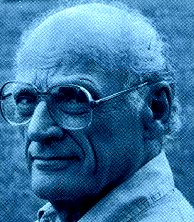
Playwright; born in New York City.
He graduated from the University of Michigan (1938), where he won a prize
for playwrighting. After serving in the U.S. Army in World War II, he enjoyed
his first success with a novel, Focus (1945). His first play, The Man Who
Had All the Luck (1944), was a flop, but All My Sons (1947) won the New
York Drama Critic Circle Award. Two years later, Death of a Salesman won
both the Drama Critics Circle Award and the Pulitzer Prize; the play, considered
his most enduring work and an American classic, depicts the
corrosive effect of self-deception
on an ordinary man and his family. An Enemy of the People (1950) was a
new translation of the Ibsen play. The Crucible 1953) told of the witch
trials in Salem and was seen as a metaphor for his views on contemporary
McCarthyite Red-baiting. Later plays include A View from the Bridge (1955)
and After the Fall (1964), widely assumed to be based on his marriage to
Marilyn Monroe (1956--60). He wrote an original screenplay, The Misfits
(1961), which starred Monroe. His later works, including The American Clock
(1980), met with little enthusiasm in the U.S.A., but he continued to enjoy
a wide following in England and
his plays are done in translations
throughout the world.
© http://search.biography.com/print_record.pl?id=17653
DANFORTH: A little while ago you were afflicted. Now it seems you afflict others; where did you find this power?
MARY WARREN (staring at Abigail): I--have no power.
GIRLS: I have no power.
PROCTOR: They're gulling you, Mister!
DANFORTH: Why did you turn about this past two weeks? You have seen the Devil, have you not?
HALE (indicating Abigail and the girls): You cannot believe them!
MARY WARREN: I--
PROCTOR (sensing her weakening): Mary, God damns all liars!
DANFORTH (pounding it into her): You have seen the Devil, you have made compact with Lucifer, have you not?
PROCTOR: God damns liars, Mary! (Mary utters something unintelligible,
staring at Abigail, who keeps watching the
"bird" above.)...
--from The Crucible
A leading American playwright, Arthur Miller, b. New York City, Oct.
17, 1915, has enriched the
Broadway stage for several decades. Although Miller's dramas take place
in familial settings, he has made a
reputation for dealing with contemporary political and moral issues.
Miller began writing plays while a student at the University of Michigan,
where several of his dramatic efforts
were rewarded with prizes. In 1937, during his senior year, one of
his early plays was presented in Detroit by
the Federal Theatre Project. In 1944 his The Man Who Had All the Luck
won a prize offered by New York
City's Theatre Guild.
With his first successes--All My Sons (1947; film, 1948), winner of
the Drama Critics Circle Award, and
Death of a Salesman (1949; film, 1952), winner of both the Drama Critics
Circle Award and the Pulitzer
Prize--Miller condemned the American ideal of prosperity on the grounds
that few can pursue it without
making dangerous moral compromises. Death of a Salesman, with its expressionistic
overtones, remains
Miller's most widely admired work. The keen social conscience evident
in these plays has continued to
manifest itself in Miller's writing. In the Tony Award-winning The
Crucible (1953), for instance, he wrote of
the witch-hunts in colonial Salem, Mass., and implied a parallel with
the congressional investigations into
subversion then in progress. The probing psychological tragedy A View
from the Bridge (1955) questions
the reasonableness of U.S. immigration laws. After the Fall (1964),
which includes a thinly disguised
portrayal of Miller's unhappy marriage to film actress Marilyn Monroe,
offers a second, candid consideration
of the congressional investigations in which Miller had been personally
involved. Two one-act plays, Incident
at Vichy (1964) and The Price (1968), deal with the universality of
human responsibility and the guilt that
often accompanies survival and success.
Miller's later dramatic works include The Creation of the World and
Other Business (1972), a play that
seemed too openly didactic for both critics and audiences, and The
Ride Down Mount Morgan (1991),
which opened in London to mixed reviews. Imbued with a passionate morality
and demonstrating the absolute
need for responsible, loving connections between people, most of Miller's
work is indeed didactic.
Miller's writings outside the theater have been prolific and varied.
His novel Focus (1945) is an ironic tale of
anti-semitism. The screenplay for the Misfits (1961) is only one of
several he has written. In 1969 he wrote In
Russia, a travel piece with illustrations by his wife, the photographer
Inge Morath. Chinese Encounters
(1979) is another traveler's tale, while Salesman in Beijing (1984)
is an account of the production of his play
in Chinese. The Theater Essays of Arthur Miller were collected in 1978.
In 1987, Miller published
Timebends: A Life, his autobiography.
Malcolm Goldstein
Bibliography: Bigsby, C. W., A Critical Introduction to 20th Century
American Drama, vol. 2 (1985);
Carson, Neil, Arthur Miller (1988); Corrigan, Robert W., ed., Arthur
Miller: A Collection of Critical
Essays (1969); Evans, Richard I., Psychology and Arthur Miller (1969;
repr. 1981); Hogan, Robert,
Arthur Miller (1967); Huftel, Sheila, Arthur Miller: The Burning Glass
(1965); Moss, Leonard, Arthur
Miller, rev. ed. (1980); Nelson, Benjamin, Arthur Miller: Portrait
of a Playwright (1970); Roudane,
Matthew C., Conversations with Arthur Miller (1987); Schlueter, Jane,
and Flanagan, James K., Arthur
Miller (1987); Welland, Dennis, Miller, The Playwright, 2d ed. (1983).
Text Copyright © 1993 Grolier Incorporated
© http://www.levity.com/corduroy/millera.htm
©2001, Cándido Pérez Gállego.
Página creada y actualizada por grupo "mmm".
Para cualquier cambio, sugerencia, etc. contactar con: fores@uv.es
© a.r.e.a./Dr.Vicente Forés López
Universitat de València Press